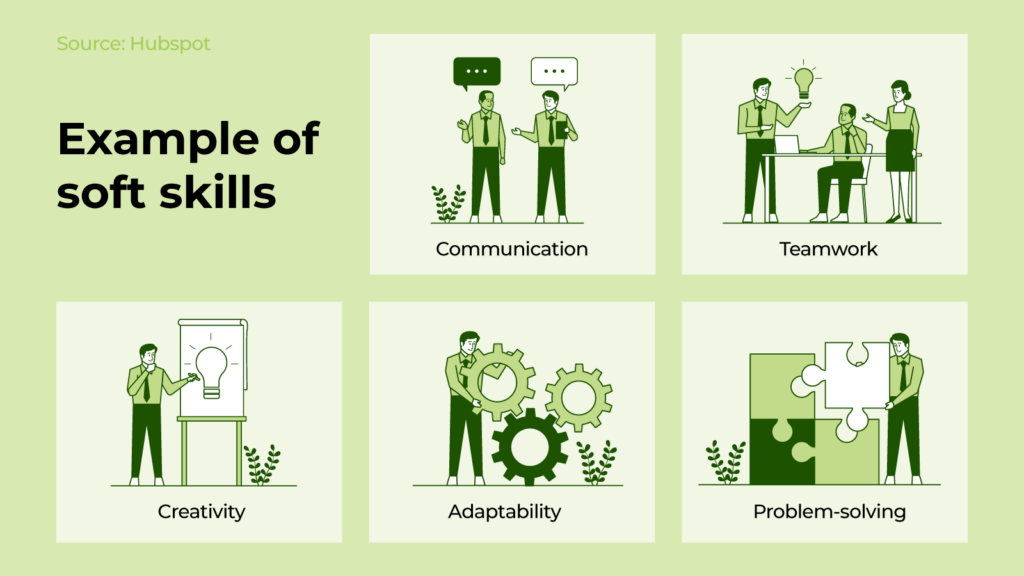
協働の世界におけるソフトスキル評価の意義

数十年にわたる経験と各分野の専門知識を生かし、技術面を極めることでニッチを切り開くことに成功した組織は数多い。
この領域における彼らの熟練度は、彼らが作り出す製品、提供するサービス、そして彼らが維持する評判に表れている。
しかし、リーダーシップ、卓越性、世界的な影響力といったさらなる高みを目指す中で、戦略的なプレイブックには、候補者のソフトスキルという重要なパズルのピースが欠けていることが多い。
これらのスキルは、効果的なコミュニケーション、感情的知性、チーム・コラボレーション、適応性などの側面を包含し、しばしばチーム、部門、組織全体を結びつける無形の接着剤の役割を果たす。
企業のリーダーシップという大きな賭けのゲームにおいて、技術的な実力は足がかりを確保することができるが、優れた人材と偉大な人材、そして業界のリーダーとその他大勢を真に差別化するのは、こうしたソフトスキルである。
真の組織の卓越性と影響力のあるリーダーシップを追求するためには、こうしたソフトスキルを受け入れ、育てることが、単なる選択肢ではなく、必須となる。
の重要な役割をより深く掘り下げる。 事業成長におけるソフトスキル そして、リーダーシップ開発とコラボレーションにおける比類なき成功を引き出すカギとなる。
ソフトスキルの力を引き出す
ソフト・スキルの定義
例えば、ソフト・スキルは、テクニカル・スキルや「ハード」スキルとは対照的である。ハードスキルは数値化できる重要なものである一方、ソフトスキルは対人関係や対人関係のダイナミクスといった、より微妙な領域に踏み込んだものである。
他者とのシームレスな交流を促進し、チームワーク、共感、効果的なコミュニケーションを育むコンピテンシーを体現している。
さらに、彼らはまた、次のようなものも内包している。 対人能力 自己認識、自己規制、意思決定、そして変化し続ける職業環境における適応力に必要なものである。
ビジネスの世界が進化し続けるにつれ、こうしたソフトスキルの重要性はますます高まり、単なる技術的な専門知識とプロとしての総合的な成功とのギャップを埋めている。
なぜソフトスキル評価がリーダーシップの基幹なのか
. In this ever-shifting environment, soft skills have taken center stage. They are no longer optional but rather essential prerequisites for success. Why? Primarily because 89% of recruiters say that when a hire doesn’t work out, it usually comes down to a lack of soft skills.
As automation takes over repetitive tasks, employers are actively seeking individuals who bring uniquely human qualities to the table: individuals who can communicate effectively, build strong relationships, think critically, and demonstrate resilience in the face of challenges. This shift in demand underscores the escalating significance of soft skills in shaping today’s work environment.

さらに、ソフト・スキルは、多様な個性を統合し、協力的なチームへと融合させる結合剤の役割を果たす。
こうした必要不可欠なソフトスキルを身につけたマネジャーにとって、多様な才能を導くという課題は、より管理しやすく生産的なものとなり、チームを単なる機能的なものから真に卓越したものへと昇華させる。
現代の職場は進化し続けているエモーショナル・インテリジェンスと対人感覚を重視するソフト・スキルは、「持っていて損はない」ものから、リーダーを目指す者にとって絶対に必要なものへと変化した。
A deep dive into key soft skills for workplace success
Let’s face it: a fulfilling and successful career takes more than just hard skills. While those technical abilities are undoubtedly important, they represent only one side of the coin. To truly thrive in today’s dynamic work environments, you need a robust set of soft skills. Why are these skills so important? Because they dictate how you interact with people, approach challenges, and navigate the complexities of the modern workplace.
Communication and interpersonal skills
Effective communication sits at the heart of success in any workplace. It’s about conveying your ideas clearly, actively listening to others, and fostering an open dialogue. Strong interpersonal skills go hand in hand with communication. This means building positive relationships with colleagues, understanding diverse perspectives, and navigating workplace dynamics with tact and empathy.
Leadership and teamwork abilities
You don’t need a fancy title to be a leader. Leadership skills are about taking initiative, inspiring others, and working collaboratively towards shared goals. Equally important is the ability to function effectively within a team. This encompasses active participation, respectful collaboration, and a willingness to both contribute and learn from others.
Problem-solving and analytical thinking
Every workplace presents its share of challenges. Problem-solving and analytical thinking are crucial for identifying problems, evaluating possible solutions, and making sound decisions. This involves critical thinking, a systematic approach, and the ability to analyze information objectively to reach informed conclusions.
Flexibility and adaptability
The only constant in today’s workplace is change. Flexibility and adaptability are essential for navigating shifting priorities, embracing new technologies, and thriving in an environment of constant evolution. This means being open to new ideas, willing to step outside your comfort zone, and capable of adjusting your approach as needed.
Creativity and innovation
Creativity and innovation are highly prized assets. These skills empower you to think outside the box, generate novel solutions, and contribute fresh perspectives. Whether you’re brainstorming new ideas or finding innovative ways to improve existing processes, a creative spark can set you apart.
A 2008 poll by SHRM, as reported by the Department of Labor, highlighted the significance of certain soft skills. The poll identified critical thinking/problem solving, leadership, professionalism/work ethic, teamwork/collaboration, and adaptability/flexibility as key soft skills valued by employers. This underscores the importance of cultivating these skills to thrive in a dynamic workplace.
The art of measuring soft skills: Challenges and solutions
Let’s be real for a second – assessing soft skills like communication, teamwork, and adaptability is no walk in the park. Unlike concrete technical skills that can be evaluated through standardized tests, soft skills reside in the realm of behavior and personality. This inherent subjectivity makes their assessment a fascinating challenge.
Understanding the difficulties in soft skill assessment
Imagine trying to capture lightning in a bottle – that’s what assessing soft skills sometimes feels like. Why is it so tricky? Let’s break down the core challenges:
- Subjectivity: Every observer interprets behavior through their own lens, potentially leading to inconsistencies in evaluation. What one person perceives as assertive, another might see as aggressive.
- Context dependency: The way a soft skill manifests itself can vary greatly depending on the situation. Someone who’s a brilliant communicator in team settings might clam up during a formal presentation.
- Measurement difficulty: Traditional exams fall short in capturing the nuances of soft skills. How do you accurately quantify empathy or creativity on a multiple-choice test?
These complexities make it clear that assessing soft skills requires a more nuanced and multi-faceted approach than traditional methods allow.
Quantitative vs qualitative approaches
Navigating the world of soft skill assessment often means choosing between two distinct paths:
- Quantitative approaches: These methods rely on measurable data, often gathered through tools like multiple-choice assessments, situational judgment tests, and even gamified simulations. While they offer a sense of objectivity, they can sometimes miss the subtle nuances of human behavior.
- Qualitative approaches: This path delves deeper, utilizing techniques like behavioral interviews, open-ended questionnaires, and observation in realistic settings. While incredibly valuable, these methods can be resource-intensive and require trained assessors to interpret the gathered information.
The key to truly effective soft skills assessment often lies in finding the sweet spot – a strategic blend of both quantitative and qualitative approaches. By combining objective measures with insightful qualitative data, a more complete and accurate picture of an individual’s soft skill proficiency can be painted.

Innovative methods for assessing soft skills
Soft skills are personal attributes that enable someone to interact effectively and harmoniously with others. Assessing these skills, however, can be challenging. Unlike technical skills, which are easily quantifiable, soft skills are more nuanced and harder to measure. That’s where innovative assessment methods come in. Let’s delve into some of the latest approaches used by companies to evaluate candidates’ soft skills.
Behavioral interviews: Revealing true potential
Traditional interviews often fail to accurately assess a candidate’s soft skills. Behavioral interviews, on the other hand, focus on understanding a candidate’s past behavior to predict their future performance. This method uses open-ended questions that prompt candidates to share specific examples of how they’ve handled situations requiring different soft skills.
For example, instead of asking “Are you a team player?”, the interviewer might ask “Tell me about a time when you had to work with a difficult team member. What was your role, and how did you handle the situation?”. This approach provides valuable insights into a candidate’s conflict-resolution, communication, and teamwork skills.
Simulations and role-playing activities
Experiential learning offers a practical approach to soft skill assessments. By engaging in simulations and role-playing activities, individuals can demonstrate their soft skills in a controlled environment. These activities allow assessors to observe how candidates handle real-life scenarios, such as resolving customer complaints, negotiating deals, or managing conflicts within a team.
Imagine a sales role where candidates participate in a mock sales pitch. This kind of simulation offers valuable insights into their communication, persuasion, and problem-solving skills. Similarly, role-playing activities can assess leadership, teamwork, and adaptability by presenting candidates with challenging scenarios that require them to think on their feet and make decisions under pressure.
Use of advanced psychometric tests
Psychometric tests have long been used in recruitment, but advancements in technology have paved the way for more sophisticated tools. These tests delve deeper into personality traits, cognitive abilities, and emotional intelligence – all of which contribute to a person’s soft skills repertoire. By leveraging data-driven insights, these tests provide a more objective and comprehensive understanding of a candidate’s strengths and weaknesses.
These soft skills assessments go beyond traditional personality tests. They use algorithms and data analysis to identify patterns and predict how individuals are likely to behave in different situations. This information is crucial for organizations as they strive to build high-performing teams with individuals who possess complementary soft skills.
Peer feedback and 360-degree assessments
The modern workplace is increasingly collaborative, making peer feedback an invaluable tool for soft skill assessments. 360-degree assessments, which gather feedback from multiple sources (supervisors, peers, subordinates, and even clients), offer a holistic view of an individual’s soft skills. This method provides a more comprehensive understanding of how individuals interact with others and navigate workplace dynamics.
In addition to performance reviews, regular peer feedback sessions foster a culture of continuous learning and development. When implemented effectively, this approach not only helps individuals identify areas for improvement but also fosters a more collaborative and supportive work environment.

このような管理された環境は、テストの場としてだけでなく、改良の場としても機能する。ここでは、即座にフィードバックを得て、アプローチを再調整し、重要な対人スキルを繰り返し向上させることができる。
この練習、フィードバック、改善のサイクルは、スキルセットと個人の自己肯定感の両方を強化する。
As the adage goes, “Practice makes perfect.” Over time, consistent engagement and refinement in these settings cultivate heightened confidence, robust management capabilities, and overall proficiency.
こうして、保護された環境を超えて、台本にない本物の難題に直面したとき、個人は十分な準備をし、ソフトスキルの評価ツールで武装し、複雑な状況を優雅かつ効果的に乗り切る自信があることに気づく。
最後の言葉
キャリアアップを目指す上で、テクニカル・スキルは間違いなく岩盤となり、安定性と地盤を提供する。しかし、重要なのはソフトスキルであり、プロフェッショナルを単なる貢献者から傑出したリーダーへと形成し、昇華させるアーキテクトとして機能する。
コミュニケーション、共感力、チームワーク、適応力、批判的思考力など、これらの重要なソフトスキルは、リーダーシップの高みやプロフェッショナルとしての卓越性の頂点への上昇を促進する足場となる。
こうした重要な性格特性を積極的に見極め、育てることで、自分のレパートリーを増やすだけでなく、自分の道を切り開くことができる。
これらの重要なソフトスキルを受け入れ、磨くことで、あなたは機械の単なる歯車のひとつから、ダイナミックなリーダーへと変貌し、方向性を舵取りし、労働力の未来を形作ることができる。
DevSkillerのソフトスキルアセスメントツールがソフトスキル管理にどのように役立つかをご覧ください。
デモを予約する 製品の専門家にご相談いただくか、このクイック・ビデオをご覧ください。 5分間のデモビデオ をご覧ください。
よくあるご質問
- キャリアの後半でソフトスキルを身につけることは可能なのだろうか?
もちろんだ!献身と練習、そして適切なリソースがあれば、ソフトスキルはキャリアのどの段階でも培うことができる。 - 組織はどのようにソフトスキル開発を支援できるのか?
組織は、研修プログラム、メンターシップの機会を提供し、対人関係における卓越性を評価・促進し、ソフト・スキルの開発を奨励する環境を整えることができる。 - ソフト・スキルは業界特有のものか?
いや、ソフトスキルは特定の業界や役割を超えて普遍的に通用するものだ。 - ソフトスキルトレーニングのROIを測定するには?
テクニカルスキルよりも無形のものではあるが、ソフトスキルトレーニングのROIは、チームダイナミクスの改善、生産性の向上、リーダーシップ能力の強化によって測ることができる。 - 指導的役割において、ソフトスキルはテクニカルスキルを上回るのか?
どちらも不可欠だ。しかし、指導的役割においては、指導し、鼓舞し、協力する能力は、しばしばソフトスキルのほうにかかっている。




